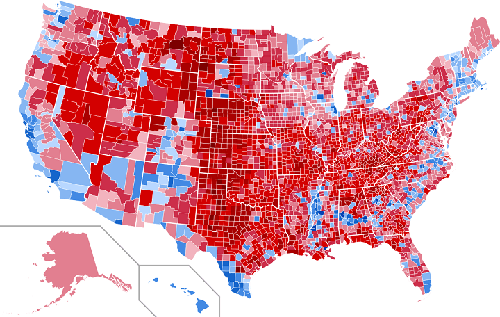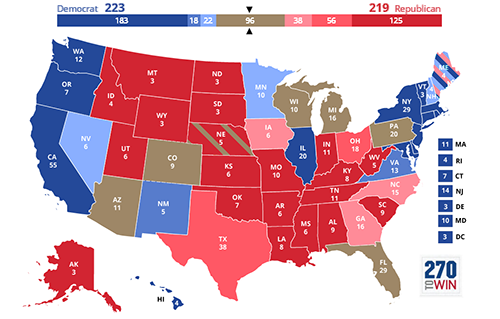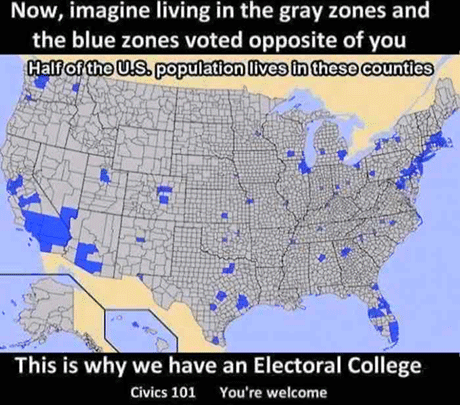Electoral College - The Importance of the Electoral College
[Originally published May, 2019]
If you don't understand why the Electoral College exists, you're the reason why it exists.
Colorado Gov. Polis signed the national popular vote bill into law on March 15, 2019.
First, a note on the fake news aspect. The Electoral College is established in Article II of the Constitution. By labelling the Electoral College as controversial, 9 News implicitly lends credibility to those who wish to dismantle our Constitutional Republic. Second, it is important to understand why Democrats want to abolish the electoral college.
From the article Abolish the electoral college? Dream on, Democrats, The Washington Post, November 16, 2016:
Sen. Barbara Boxer (D-Calif.), as she has before, introduced a bill this week to get rid of the electoral college. In the below post from the wee hours of the day after Election Day, we discuss why it's not happening... For the second time in 16 years, Democrats appear to have won more votes than Republicans, but lost the presidency. And while it was close in 2000, it may be a chasm in 2016....
So you can bet that are a whole bunch of Democrats right now that would like to put an end to this whole electoral college thing.
The bad news: They have virtually no power to make that happen -- and even they did have any power, it'd be immensely difficult.
The electoral college, after all, is enshrined in our Constitution, which means getting rid of it requires a constitutional amendment. That's a two-thirds vote in both the House and the Senate and the ratification of three-fourths (38) of the 50 states....
Back in 1934, a vote to abolish the electoral college failed in the Senate by just two votes. At the time, then-Sen. Alben Barkley (D-Ky.), who would later become vice president, labeled the system "useless." "The American people are qualified to elect their president by a direct vote, and I hope to see the day when they will," he said.
By 1966, Sen. Birch Bayh (D-Ind.) led hearings on the prospect of repealing the electoral college. He was a passionate advocate for the change for years. In 1979, the Senate debated a direct-election alternative, but it failed 51-48 -- shy of the two-thirds it needed.
More recent efforts have focused on workarounds, rather than repeal.
The National Popular Vote interstate compact has been assembling states who pledge to award all of their electoral votes to the winner of the national vote if and when they all combine for a majority of electoral votes (270). The effort has gained support from 11 states combining for 165 electoral votes, but so far only blue states have jumped on-board -- suggesting the red and swing state problems described above apply here too....
The Electoral College is an integral component of America's election process. From History Central: Why the Electoral College:
The Electoral College was created for two reasons. The first purpose was to create a buffer between population and the selection of a President. The second as part of the structure of the government that gave extra power to the smaller states.
The first reason that the founders created the Electoral College is hard to understand today. The founding fathers were afraid of direct election to the Presidency. They feared a tyrant could manipulate public opinion and come to power. Hamilton wrote in the Federalist Papers:
It was equally desirable, that the immediate election should be made by men most capable of analyzing the qualities adapted to the station, and acting under circumstances favorable to deliberation, and to a judicious combination of all the reasons and inducements which were proper to govern their choice. A small number of persons, selected by their fellow-citizens from the general mass, will be most likely to possess the information and discernment requisite to such complicated investigations. It was also peculiarly desirable to afford as little opportunity as possible to tumult and disorder. This evil was not least to be dreaded in the election of a magistrate, who was to have so important an agency in the administration of the government as the President of the United States. But the precautions which have been so happily concerted in the system under consideration, promise an effectual security against this mischief....
Hamilton and the other founders believed that the electors would be able to insure that only a qualified person becomes President. They believed that with the Electoral College no one would be able to manipulate the citizenry. It would act as check on an electorate that might be duped. Hamilton and the other founders did not trust the population to make the right choice. The founders also believed that the Electoral College had the advantage of being a group that met only once and thus could not be manipulated over time by foreign governments or others....
One aspect of the electoral system that is not mandated in the constitution is the fact that the winner takes all the votes in the state. Therefore it makes no difference if you win a state by 50.1% or by 80% of the vote you receive the same number of electoral votes. This can be a recipe for one individual to win some states by large pluralities and lose others by small number of votes, and thus this is an easy scenario for one candidate winning the popular vote while another winning the electoral vote. This winner take all methods used in picking electors has been decided by the states themselves. This trend took place over the course of the 19th century....
In the January 8, 2019 article, The Electoral College Must Remain, Elad Hakim states:
Rep. Steve Cohen, D-Tenn., recently introduced a proposed constitutional amendment that would eliminate the Electoral College. This was obviously done in response to the fact that Hillary Clinton lost the 2016 election despite winning nearly 3 million more votes than President Trump....
Cohen's position is clearly partisan, will almost certainly fail, and will face stiff resistance from many smaller states.
According to HistoryCentral, "[t]he Electoral College was created for two reasons. The first purpose was to create a buffer between population and the selection of a President. The second as part of the structure of the government that gave extra power to the smaller states." The first reason revolved around the possibility that a candidate could manipulate public opinion to such a great extent that it would lead him to secure the presidency. In other words, the Founders did not believe that the citizens could make the right decision on their own. Therefore, the electorate served as a system of checks and balances. This does not appear to be as much of a concern today.
The second reason, however, is still relevant. Generally speaking, the number of electorates in a given state directly correlates to the number of congressional representatives in the state. The minimum number of electorates for a given state is three. Therefore, the "value" of a vote in a smaller state with a lower population would "count" more than it would in a state with a higher population. For example, if a state had 90,000 votes and had three electorates, each electorate would represent 30,000 votes. On the other hand, a large state with 10,000,000 votes and 54 electorates would mean that each electorate would represent approximately 185,000 votes. Therefore, this system was initially used to appease the smaller states....
While the Electoral College is not perfect, it is the most legitimate system. It is in line with the intent of our forefathers, protects the smaller states, and helps to protect against the possibility that several very densely populated cities will decide the presidential election for the entire nation.
Hakim's conclusion bears repeating: The Electoral College as established in Article II of the U.S. Constitution is the most legitimate system. It protects against the likelihood that densely populated cities - that tend to vote Democrat - could decide the presidential election for the entire country.
How Does the Electoral College Actually Work? Explore the process with this seven-step graphic. The Heritage Foundation.
Election of President and Vice President, National Constitution Center.
Contingent Election of the President and Vice President by Congress: Perspectives and Contemporary Analysis, Gongressional Research Service.
What Is the Contingent Election and Voting Process? Findlaw.
Related
2016 U.S. Presidential Electoral votes by county:
Update: As the Electoral College Goes, So Goes the Constitution, by Michael M. Uhlmann, August 26, 2019:
The Framers understood the limits of simple-minded majoritarianism of the sort embraced by direct election. If elections were simply a matter of counting heads and stopping when you got to 50% plus one, we could dispense with all the checks and balances of the Constitution, including federalism, bicameralism, the separation of powers, and, yes, the Electoral College. The point of these time-honored devices, which are all part of an integral whole, is not to circumvent popular sentiment, but to shape and channel it in ways that support the principal end for which popular government is constituted: to secure the equal rights of all. Majority rule can become majority tyranny, as the wisest thinkers on politics have always known. The trick in establishing popular government is to empower the majority without endangering the rights of minorities....
Update: The Mob Is Right Outside the Constitution’s Wall, Breitbart, May 24, 2019:
On Tuesday, Nevada became the 15th state, along with the District of Columbia, to pass a measure that would grant its electoral college votes to the candidate that won the nationwide popular vote....
This movement is being led by an organization called National Popular Vote. The 501(c)(4) was co-founded by election law expert and attorney Barry Fadem and John Kaza (co-inventor of the scratch off lottery ticket).
The objective is to have a group of states that in total control 270 electoral votes (the number needed to win the presidency) form a compact wherein each of them will agree to cast those votes based on the nationwide popular vote, regardless of how their own state’s citizens voted....
Our Founding Fathers had the debate at the beginning of our nation as to how our system of election and governance would be structured. Democracy was rejected because of the well understood tendency of a majority to act as a tyrant. While much of what was created by our Founders was original, this concept wasn’t.
The critique of democracy dates back to Plato and the Republic. The demos, as they were called in Greek, couldn’t be trusted; they would just vote to satiate their voracious appetites at the expense of others or the nation at large....
In Madison’s mind, the structure of government and the process for electing the chief executive were designed to try to fragment the power of majority.
When you read Federalist 9> (Hamilton), Federalist10, and Federalist 51 (Madison), three key elements they felt existed to help give the new United States a chance for success were its population size, geographic size, and the differing interests of the independent states. Back in the late 1700’s, these factors would all make it more difficult for minority factions to attain the sort of critical mass required to do real damage....
We need these controls to prevent the very kind of efficiency in voting that can lead to majority dominance. The electoral college is one of those most fundamental controls. If we effectively neuter it through state collusion, then we move one step closer to a world our Founders feared, and that Plato described.
For those who are wondering, Plato’s next stage was total tyranny....
The Invention of the Electoral College, Consortium News, November 5, 2020.
The Founders Outsmarted the Presidential Election Fraudsters, by Gary Gindler, American Thinker, November 13, 2020:
... contrary to popular misconception, the President of the United States is not a representative of the American people. State legislators and governors are representatives of the people, and at the federal level so are the members of the House of Representatives of the United States Congress...
The President of the United States of America, according to the Constitution, represents state legislators' interests and no one else....
In building the American state, the fundamental principle was state control over the newly created federal power structure. Therefore, from the Founding Fathers' point of view, the federal government in Washington should consist of both representatives of the people (congressmen) and representatives of the state leadership – the federal President and senators. This is how the institution of the Electoral College was invented and implemented. The electors are appointed by the state legislatures, and they are the ones who elect the President of the country.
So why do American citizens need to participate in the presidential elections? Well, strictly speaking, it is not necessary. It is just that there is a long tradition in America – state legislators appoint electors in such a way that these appointments correspond to the mood of the people (in some states, this is even enshrined by law). This is a tradition, but according to the U.S. Constitution, the participation of the people in presidential elections, generally speaking, is not required. According to the Constitution, the people participate in the direct elections of their legislators, which is quite enough....
Thus, under the Constitution, state legislators have the right to generally ignore the results of the voting of citizens of their state and appoint those who they deem necessary to the Electoral College. Why did the Founding Fathers of the United States give state legislators such unprecedented power? Because most of the Founding Fathers were geniuses with impressive foresight. They did not know precisely when this would happen, but they knew it would eventually happen: the election's published results would have nothing to do with how the citizens voted....
The Electoral College is still right for America, by Rob Natelson, Complete Colorado, January 29, 2019:
... it is not true, as some claim, that the Founders acted only out of distrust of democracy. Rather, the system was a brilliant response to...
Having created a unique office, the Founders needed an adequate process for choosing its occupant. They set forth several criteria:
- The electoral process had to produce presidents competent to discharge their extensive responsibilities. Not only must the president be qualified for the job, but he must be able to exercise judgment independent of Congress and of the states. Thus, those directly choosing among the candidates should either know them personally or have reliable knowledge of their character and qualifications.
- The process should give great weight to popular preferences, while minimizing dangers of “stampeding” and other mob-like behavior.
- It should reduce the risks of foreign and other secret influence.
- It should balance state and national interests.
- It should produce presidents of national stature. A purely regional executive could tear the country apart, either by his election or by policies favoring some parts of the country at the expense of others.
- The process should discourage states from trying to increase their influence by artificially inflating their vote levels....
Did the Electoral College worked as intended in 2016? Yes and no.
It worked insofar as it denied election to Hillary Clinton, who, although the popular vote choice, was largely a regional candidate. But it failed to work insofar as state statutes prevented electors from voting for any candidates other than two widely seen as unacceptable. Those statutes also discouraged qualified people from seeking the office of presidential elector.
An end-run around the Electoral College, by Peter Skurkissm, American Thinker, February 28, 2019.
Prelude to a Revolution, National Popular Voting, by Don Mellon, Canada Free Press, March 16, 2019.
Don’t let Colorado be an Electoral College dropout, by Mike Rosen, Complete Colorado, February 5, 2019.
The One-Two Punch to Knock Out Electoral Democracy, by Michael S. Kochin, American Greatness, June 16, 2019.
Colorado Moves To Bypass Electoral College: Will Assign Electoral Votes To Popular Vote Winner, by Marc Slavo, Freedom Outpost, February 28, 2019.
Colorado Gov. Polis signs national popular vote bill into law, March 16, 2019.
See the 270 To Win website for an interactive electoral college map (included below) and electoral college maps of Historical Presidential Elections.
Video: Do You Understand the Electoral College?, by Tara Ross, PragerU.
Books:
The Indispensable Electoral College: How the Founders' Plan Saves Our Country from Mob Rule, by Tara Ross
We Elect a President: The Story of Our Electoral College, by Tara Ross.
Moving Closer to Mob Rule: No Choice, No Voice, by Ray DiLorenzo, Canada Free Press, May 25, 2019:


